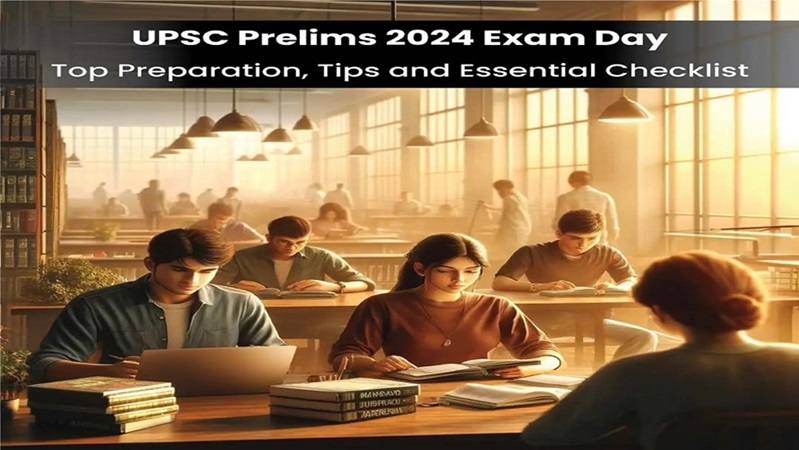With the UPSC Civil Services Prelims 2024 exam just days away, it’s crucial to utilize your remaining time effectively and ensure you’re well-prepared for the big day. Here are some important UPSC preparation tips, test-taking strategies, and an essential checklist to help you maximize your performance on June 16th from VisionIAS, the go-to IAS coaching in Delhi for UPSC aspirants.
Preparation Tips for the Final Days
1. Focused Revision
In the final days before the Civil Services exam (Prelims 2024), focus on revising the UPSC Prelims Syllabus. The goal is to solidify your understanding of what you have already studied.
Core Subjects:
- Polity: Revise important articles, amendments, and landmark judgments. Use VisionIAS Quick Revision Module for efficient revision.
- History: Focus on Modern History, especially the freedom struggle.
- Geography: Review key concepts, maps, and diagrams, focusing on physical geography and climate patterns.
- Economy: Revise fundamental concepts, budget highlights, and economic survey summaries. PT 365 is invaluable for current affairs.
- Environment: Concentrate on protected areas, biodiversity, and recent environmental developments.
- Science and Technology: Focus on recent developments, especially in space technology, biotechnology, and IT.
- Ancient and Medieval History: Revise important dynasties, cultural, and scientific developments.
- Art and Culture: Review classical dances, music, painting, architecture, and literature.
Current Affairs: Focus on the last 12-14 months of current affairs. Use concise monthly compilations and revise key events, government schemes, and international affairs. VisionIAS PT 365 is a great resource for this.
2. Mock Tests and Previous Year Papers
Attempt 1-2 full-length mock tests. Focus on tests that simulate actual exam conditions. Review your answers critically to understand your mistakes.
Go through the last 5 years of UPSC Prelims papers. Analyzing previous papers helps understand the pattern and frequently asked topics. The 7-Year UPSC PYQ Trend Analysis provides detailed analysis and smart notes.
3. Time Management and Strategy
Plan to allocate around 1 minute per question. Prioritize easy and medium-difficulty questions first and revisit difficult ones later. Develop a strategy for deciding which questions to attempt and which to skip, avoiding guesswork unless you can eliminate at least two options.
4. Maintain Health and Well-being
Ensure you get adequate sleep (7-8 hours). Maintain a balanced diet and stay hydrated. Practice relaxation techniques like deep breathing or meditation. Keep a positive mindset and avoid last-minute panic.
5. Exam Day Readiness
Keep your admit card and a valid ID proof ready. Print multiple copies of the admit card and ensure your ID proof is current and valid. Place these documents in a secure folder and keep them in your bag the night before the exam.
Carry at least 2-3 black ballpoint pens, an HB pencil, an eraser, a sharpener, and a transparent writing pad. Check all your stationery the day before to ensure everything is in working order. Plan your travel to the exam center well in advance. Aim to reach at least an hour before the reporting time.
Test-Taking Strategies for Maximized Performance
1. General Studies Paper I
Spend the first few minutes reading the entire question paper. Identify and mark questions you are confident about. Attempt easy questions first to secure sure-shot marks and boost confidence. Move on to medium-difficulty questions where you can eliminate options. Use educated guesses if needed, but be cautious with negative marking.
Keep track of time using a watch and aim to complete the paper with time to spare for review. This buffer time is crucial for revisiting marked questions and ensuring you haven’t missed anything. Mark your answers on the OMR sheet with care, double-checking question numbers and corresponding bubbles.
2. CSAT Paper II
Identify your strengths and prioritize sections accordingly. For reasoning and aptitude questions, solve them step-by-step and skip complex ones to return to later. Practice shortcuts and tricks to solve aptitude questions faster.
Allocate time based on the difficulty and length of sections. Attempt all sections to maximize your score. Don’t spend too much time on one type of question; balance your time to cover the entire paper. Attempt a few CSAT mock tests to get a feel of the paper, focusing on accuracy and speed.
3. Maintaining Focus and Calmness
Maintain a positive attitude throughout the exam. Remind yourself of your preparation and stay confident. Positive self-talk can help reduce anxiety. If overwhelmed, take deep breaths or close your eyes for a few seconds. Trust your instincts and avoid changing answers unless absolutely sure.
Essential Checklist for Exam Day
- Admit Card: Print 2-3 copies and keep them in a secure folder.
- ID Proof: Carry a valid ID proof (Aadhar card, passport, voter ID, etc.).
- Pens: 2-3 black ballpoint pens (smooth and reliable).
- Pencil, Eraser, Sharpener: For rough work and OMR sheet markings.
- Transparent Writing Pad: A4 size for ease of writing.
- Water Bottle: A transparent, unmarked water bottle to stay hydrated.
- Snacks: Light snacks like energy bars or nuts for quick energy boosts.
- Mask and Sanitizer: Follow COVID-19 protocols by carrying a mask and hand sanitizer.
- Watch: An analog watch to keep track of time (if allowed).
The final days leading up to the UPSC Prelims Exam 2024 are crucial. By following these preparation tips, employing effective test-taking strategies, and ensuring you have all the essentials ready for exam day, you can approach the exam with confidence and calmness. Remember, consistent effort and a positive mindset are key to success. Best of luck on your journey to becoming a civil servant!
Visit us at:
Or Call us at: 8468022022, 9019066066
This article includes sponsored content. The views expressed are those of the sponsor and do not necessarily reflect the official policy or position of our publication.

